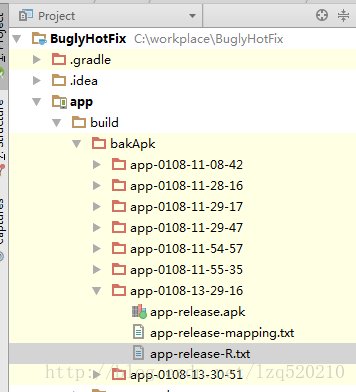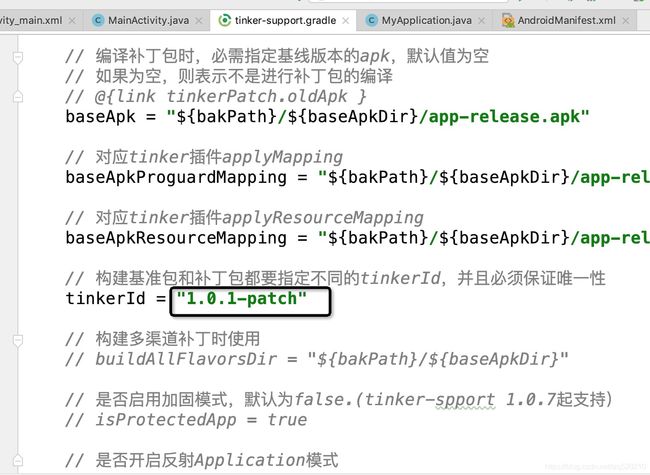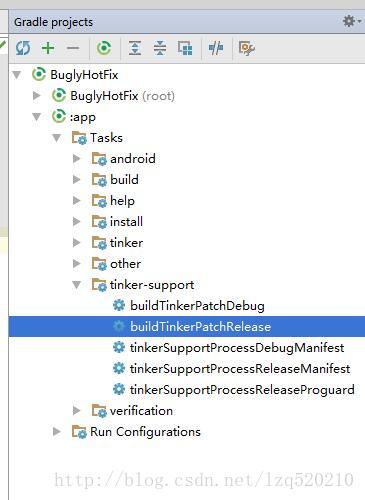Bugly热更新使用
首先简单介绍一下,热更新,即不需要用户重新下载app的情况下,悄悄的就将bug解决了。这样可以减少app版本频繁的发布,提升用户体验。
腾讯的Bugly热更新采用的是微信团队的Tinker方案,只需要集成SDK,就可以实现自动下载补丁包,合成,并应用补丁,同时,还提供了补丁管理后台供开发这操作。
目前市面上有几种热更新的方案,微信的Tinker、QQ空间的QZone、阿里的AndFix以及美团的Robust等,下面进行比较
很明显,就可以看出Tinker的优势了
下面开始介绍如何使用Bugly的热更新
注意:接入的热更新,就已经有错误上报功能了,所以就不需要单独接入异常上报了。
具体集成过程请看官方文档,Bugly的官方文档地址:https://bugly.qq.com/docs/user-guide/instruction-manual-android-hotfix/?v=20170912151050
这里我们就说一下需要注意的地方
1、在工程的根目录下(即最外层)的build.gradle文件中加入如下
buildscript {
repositories {
jcenter()
}
dependencies {
classpath 'com.android.tools.build:gradle:2.3.1'
// tinkersupport插件, 其中lastest.release指拉取最新版本,也可以指定明确版本号,例如1.0.4
classpath "com.tencent.bugly:tinker-support:1.1.1"
// NOTE: Do not place your application dependencies here; they belong
// in the individual module build.gradle files
}
}
allprojects {
repositories {
jcenter()
}
}
注意:tinker-support最新版本要指定1.1.5
2、集成SDK
在app modle下的build.gradle中加入
apply plugin: 'com.android.application'
android {
compileSdkVersion 26
buildToolsVersion "26.0.2"
defaultConfig {
applicationId "com.example.lzq.buglyhotfix"
minSdkVersion 15
targetSdkVersion 26
versionCode 1
versionName "1.0.2"
testInstrumentationRunner "android.support.test.runner.AndroidJUnitRunner"
ndk {
//设置支持的SO库架构
abiFilters 'armeabi' //, 'x86', 'armeabi-v7a', 'x86_64', 'arm64-v8a'
}
}
signingConfigs {
debug {
storeFile file('../buglyfix.jks')//签名文件路径
storePassword "a123456"
keyAlias "key0"
keyPassword "a123456" //签名密码
println("====== signingConfigs.debug ======")
}
release {
storeFile file('../buglyfix.jks')//签名文件路径
storePassword "a123456"
keyAlias "key0"
keyPassword "a123456" //签名密码
println("====== signingConfigs.release ======")
}
}
buildTypes {
release {
minifyEnabled true
proguardFiles getDefaultProguardFile('proguard-android.txt'), 'proguard-rules.pro'
signingConfig signingConfigs.release
}
debug {
signingConfig signingConfigs.release
}
}
}
dependencies {
compile fileTree(dir: 'libs', include: ['*.jar'])
androidTestCompile('com.android.support.test.espresso:espresso-core:2.2.2', {
exclude group: 'com.android.support', module: 'support-annotations'
})
compile 'com.android.support:appcompat-v7:26.+'
compile 'com.android.support.constraint:constraint-layout:1.0.2'
testCompile 'junit:junit:4.12'
compile "com.android.support:multidex:1.0.1" // 多dex配置
//注释掉原有bugly的仓库
//compile 'com.tencent.bugly:crashreport:latest.release'//其中latest.release指代最新版本号,也可以指定明确的版本号,例如2.3.2
compile 'com.tencent.bugly:crashreport_upgrade:1.3.4'//注意 此处版本号 一定要是最新的
compile 'com.tencent.bugly:nativecrashreport:latest.release' //其中latest.release指代最新版本号,也可以指定明确的版本号,例如2.2.0
}
// 依赖插件脚本
apply from: 'tinker-support.gradle'注意 此处版本号 一定要是最新的
compile 'com.tencent.bugly:nativecrashreport:latest.release' //其中latest.release指代最新版本号,也可以指定明确的版本号,例如2.2.0
}
// 依赖插件脚本
apply from: 'tinker-support.gradle'注意:要配置ndk
ndk {
//设置支持的SO库架构
abiFilters 'armeabi' //, 'x86', 'armeabi-v7a', 'x86_64', 'arm64-v8a'
}注意:一定要配置好签名
要配置默认签名,同时要设置混淆代码,依赖crashreport_upgrade时,要用最新的版本,在最后要依赖插件脚本,applay from:'tinker-support.gradle'
tinker-support.gradle要和src在同级目录下,代码如下
apply plugin: 'com.tencent.bugly.tinker-support'
def bakPath = file("${buildDir}/bakApk/")
/**
* 此处填写每次构建生成的基准包目录
*/
def baseApkDir = "app-0108-13-29-16"
/**
* 对于插件各参数的详细解析请参考
*/
tinkerSupport {
// 开启tinker-support插件,默认值true
enable = true
// 自动生成tinkerId, 你无须关注tinkerId,默认为false
autoGenerateTinkerId = true
// 指定归档目录,默认值当前module的子目录tinker
autoBackupApkDir = "${bakPath}"
// 是否启用覆盖tinkerPatch配置功能,默认值false
// 开启后tinkerPatch配置不生效,即无需添加tinkerPatch
overrideTinkerPatchConfiguration = true
// 编译补丁包时,必需指定基线版本的apk,默认值为空
// 如果为空,则表示不是进行补丁包的编译
// @{link tinkerPatch.oldApk }
baseApk = "${bakPath}/${baseApkDir}/app-release.apk"
// baseApk = "${bakPath}/${baseApkDir}/app-debug.apk"
// 对应tinker插件applyMapping
baseApkProguardMapping = "${bakPath}/${baseApkDir}/app-release-mapping.txt"
// baseApkProguardMapping = "${bakPath}/${baseApkDir}/app-debug-mapping.txt"
// 对应tinker插件applyResourceMapping
baseApkResourceMapping = "${bakPath}/${baseApkDir}/app-release-R.txt"
// baseApkResourceMapping = "${bakPath}/${baseApkDir}/app-debug-R.txt"
// 构建基准包跟补丁包都要修改tinkerId,主要用于区分
tinkerId = "patch-1.0.7"
// 打多渠道补丁时指定目录
// buildAllFlavorsDir = "${bakPath}/${baseApkDir}"
// 是否使用加固模式,默认为false
// isProtectedApp = true
// 是否采用反射Application的方式集成,无须改造Application
enableProxyApplication = true
// 支持新增Activity
supportHotplugComponent = true
}
/**
* 一般来说,我们无需对下面的参数做任何的修改
* 对于各参数的详细介绍请参考:
* https://github.com/Tencent/tinker/wiki/Tinker-%E6%8E%A5%E5%85%A5%E6%8C%87%E5%8D%97
*/
tinkerPatch {
tinkerEnable = true
ignoreWarning = false
useSign = false
dex {
dexMode = "jar"
pattern = ["classes*.dex"]
loader = []
}
lib {
pattern = ["lib/*/*.so"]
}
res {
pattern = ["res/*", "r/*", "assets/*", "resources.arsc", "AndroidManifest.xml"]
ignoreChange = []
largeModSize = 100
}
packageConfig {
}
sevenZip {
zipArtifact = "com.tencent.mm:SevenZip:1.1.10"
// path = "/usr/local/bin/7za"
}
buildConfig {
keepDexApply = false
// tinkerId = "base-2.0.1"
}
}
注意:app要有网络、读取内存卡等权限
且要适配6.0动态权限
3、打基准包
首先要在tinker-support.gradle中设置基准包的tinkerId 每次又要不一样,最好是app的版本号,如tinkerId="base-1.1.2"
利用gradle进行打包,如截图
完成后,会在module工程下的build文件中,生成一个bakApk目录,其中会有每次生成的包文件夹,包括apk,app-release-mapping.txt和app-release-R.txt
4、打补丁包
修改bug,接下来要打补丁包,
需要注意的是,
1、要设置tinker-support.gradle中的baseApkDir,内容为刚才打基准包生成的路径名称,如app-0108-13-29-16
需要注意补丁包是要根据这个baseApkDir去区分是对应哪个基准包的打的补丁包,也就是说要解决哪个版本的bug,下发时,只有这个版本的apk才能获取到对应的补丁包。
2、需要修改tinkerId
接下来利用gradle开始打补丁包

然后就可以将此安装包传到bugly的管理平台了,这里需要注意,先把我们之前打好的基准包运行起来,会有联网上报,观察log日志,如果success的话,接下来在将补丁包传到bugly的管理平台,成功后,将app杀死重新打开,过几分钟后,重启app,开始下载补丁包,合并,然后再重启,补丁包生效,是不是很简单,省去了很多步骤。





